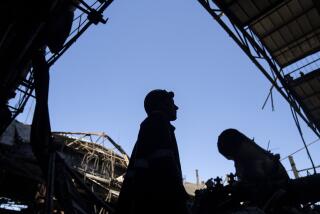After Disaster : 18 Reactors Shut Down in Soviet Union
- Share via
MOSCOW — A Western diplomat said Friday that 18 Soviet nuclear reactors, including the one that caught fire, have been shut down, and an American radiation expert predicted that the full effects of the accident at the Chernobyl plant will not be known for several weeks.
Soviet leader Mikhail S. Gorbachev, in his first public comment since the accident, sent a letter to six Third World and European leaders attacking the United States for conducting underground nuclear tests--but ignored the disaster at home.
Flew to Moscow
Dr. Robert Gale, head of the International Bone Marrow Transplant Registry, flew to Moscow Friday at the request of the Soviet Union to help treat radiation sicknesses caused by the disaster at Chernobyl, 80 miles north of Kiev.
Gale, who is affiliated with UCLA, was whisked away in secrecy, eluding a crowd of Western reporters at Moscow’s Sheremetyevo airport.
During a stopover in West Germany, the American expert said the full effects of the disaster will not be known for at least three weeks. Injuries from radiation released in the accident would have lingering effects, with serious injuries, including cataracts and bone cancer, appearing even months after the accident, he said.
Gale said he will assess the radiation damage of people exposed to fallout. The transplantation of bone marrow, the soft tissue that produces red blood cells and components of the body’s immune system, is the only way to treat radiation sickness, he said.
Tests on the clothing of some Western students who fled from the disaster area revealed high levels of radiation. Experts in London said the students were in good health, but the radiation readings indicated a serious contamination problem in Kiev and Minsk, both near Chernobyl.
‘Serious Crisis’
As Soviet authorities maintained their virtual news blackout about the disaster, a senior U.S. official in Washington said the accident represents a “serious crisis” for Gorbachev.
The Soviets have insisted that only two people died in the accident, but unconfirmed reports have placed the death toll in the hundreds or thousands.
A French student evacuated from the Kiev area said there were rumors of higher casualty counts.
“There were rumors in the streets of death counts ranging from 150 to 1,000,” said Sophie Legendre after she arrived in Paris.
A Soviet ham radio operator reported “between 600 and 700 casualties, including 60 dead,” according to an Israeli radio monitor in Jerusalem.
“I want the world to know,” said the Soviet operator, broadcasting from 40 miles south of Chernobyl. “We know there are at least between 600 and 700 casualties, including 60 dead.”
The Soviet, who declined to give his name, spoke Friday with Israeli monitor David Ben-Bassat, who said the man did not say how he obtained the information.
‘We Are All Terrified’
“I’m terrified. We are all terrified,” Ben-Bassat quoted the Soviet radio operator as saying. “We don’t know if it affects us. But we are terrified. We don’t know what to do.”
In London, a specialist in nuclear fallout said anyone within five to 10 miles of the Chernobyl plant could die in the next few days or weeks if they were outside when the disaster struck.
Peter Taylor, a specialist in the biological effects of nuclear fallout for the Political Ecology Research Group, said the disaster was “an accident at the top of the scale of possible accidents from nuclear installations.”
A Western diplomat in Moscow labeled as “silly” reports that the fire at the Chernobyl nuclear plant had been put out by dumping wet sand on the flames.
“If you dump sand on it you might put out the fire, but then all you do is cover the meltdown and force it down into the ground,” the diplomat said.
Experts have said one of the greatest dangers of the nuclear accident is a meltdown of nuclear fuel that would contaminate ground water and ruin farmland.
No Harm Seen to U.S.
A Reagan Administration advisory group that convened in Washington said Friday the accident was not likely to “result in adverse health consequences for the United States.”
Meanwhile in Europe, hundreds of West Germans called a weather center Friday to ask about the risk of fallout. Yugoslavia warned its citizens not to spend too much time outdoors.
All over Europe, people worried about the Soviet nuclear reactor accident have been swamping government offices, hospitals and pharmacies with medical and travel queries.
Most European governments, however, have assured their citizens that low-level radiation from the Chernobyl nuclear accident poses no health threat.
“We are naturally quite worried,” said Mikael Berntson, 31, a postal clerk in Stockholm, Sweden. “But we are not struck by panic or anything like that.”
Since Sweden first detected higher-than-normal radiation levels Monday, clouds of radioactive dust from the Chernobyl plant in the southwestern Soviet Union have drifted across much of Europe.
Levels have been dropping in Scandinavia, but shifting winds have carried the fallout into Romania, Hungary, eastern Czechoslovakia and Austria.
More to Read
Sign up for Essential California
The most important California stories and recommendations in your inbox every morning.
You may occasionally receive promotional content from the Los Angeles Times.













